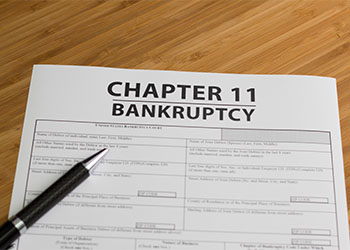Who Gets Paid First in Chapter 11 Bankruptcy?
Oct. 17, 2023
 If your business is struggling with too much debt, you may be considering Chapter 11 bankruptcy as a way to repay your creditors while staying open. As a responsible business owner, you may be wondering, “Which creditor will get paid first?” Generally, the creditors are paid based on a pre-determined priority order.
If your business is struggling with too much debt, you may be considering Chapter 11 bankruptcy as a way to repay your creditors while staying open. As a responsible business owner, you may be wondering, “Which creditor will get paid first?” Generally, the creditors are paid based on a pre-determined priority order.
The Law Offices of David K. Blazek, P.C. has helped hundreds of businesses reorganize their debts and pay them off through Chapter 11 without having to shut down operations. However, every business is different, which is why what works for one may not work for another. Consider speaking with a bankruptcy attorney to discuss whether filing for Chapter 11 bankruptcy would be the best solution to your debts.
The Law Offices of David K. Blazek, P.C. has offices in Boca Raton and Tampa, Florida, and Atlanta, Georgia, but also serves surrounding areas such as Miami, Orlando, and Jacksonville in Florida, and Columbus and Macon in Georgia.
Overview of Chapter 11
Chapter 11 is a legal process available to most types of businesses and, less frequently, individuals. Chapter 11 bankruptcy, commonly referred to as a “reorganization” bankruptcy, allows businesses to restructure their debts to make them more manageable while maintaining their day-to-day operations.
What Order Do Creditors Get Paid in Chapter 11 Bankruptcy?
Although there may be exceptions, creditors in Chapter 11 bankruptcy generally get paid based on a pre-determined priority order:
Secured creditors. Secured creditors are creditors that have a charge over the debtor’s assets. A secured creditor is any creditor to whom a business pledged an asset as collateral or security to get credit. If there are multiple secured creditors, the court will typically consider each asset that secures the business’s loans to determine which creditor should get paid first.
Unsecured creditors. An unsecured creditor is any individual or entity that lends money without getting any of the business’s assets as collateral. Common examples of unsecured creditors are vendors, bondholders, and suppliers. Unsecured creditors typically get paid second, after secured creditors.
Stockholders. If there is any money left after repaying secured and unsecured creditors, stockholders will typically be the last ones to be paid in Chapter 11 bankruptcy.
One thing to consider is that your reorganization plan under Chapter 11 bankruptcy may not pay back your creditors in full, causing damage to relationships with secured creditors (e.g., banks), unsecured creditors (e.g., vendors), or stockholders, which can negatively impact your business operations and opportunities for credit in the future.
Can You Pay Creditors Ahead of Your Bankruptcy?
Once business owners make up their minds about filing for Chapter 11 bankruptcy, they often decide to pay some creditors ahead of bankruptcy. However, doing so carries certain risks and potential legal implications. Under bankruptcy law, any pre-bankruptcy payment that meets the following criteria may be considered a “preferential payment”:
Payments over $600
Payments made to lenders considered “insiders” under the law (an insider can be the debtor’s relative, general partner, or business that the debtor directs or controls)
Payments made within 90 days of the filing date
Preferential payments come under increased scrutiny by bankruptcy courts. In certain cases, when a debtor makes a preferential payment to one creditor while knowing there is not enough money to pay other creditors, the debtor may be accused of fraud.
Pro Rata Distributions
Under bankruptcy law, “pro rata” means the amount each creditor can be repaid is divided proportionally based on the size of their claims when there are not enough assets to go around. For example, if a debtor can only pay 30% of all claims among the lower-tiered creditors, each of these creditors will get only 30% of the debt. If a debtor owes $1,000 to creditor A and $1,500 to creditor B, the debtor will pay only $300 to creditor A and $450 to creditor B under the pro-rata rule.
The Financial Guidance You Need
If you are thinking about filing for bankruptcy, you might want to discuss your situation with an attorney. A skilled bankruptcy attorney at The Law Offices of David K. Blazek, P.C. can provide you with the guidance you need to determine if Chapter 11 bankruptcy will bring you the relief you need to get your business out from under the crushing debt. Schedule a free consultation today to discuss your situation.
